Since Thursday, March 28, DFW Western District personnel have been stocking trout into our local waters. Approximately 100,000 trout are expected to be stocked here this spring. Waters stocked to date are: Deerfield River in Florida, Charlemont and Buckland; West Branch of the Farmington River in Sandisfield, Tolland and Otis; Konkapot River in Monterey and New Marlborough, East Branch of Westfield River in Windsor, Cummington and Chesterfield; West Branch of the Westfield River in Becket, Middlefield, Chester and Huntington; Richmond Pond, Stockbridge Bowl, Lake Buel, Laurel Lake and Onota Lake.
All of the trout stocked were nice sized rainbows.
The pictures of the old man and kid? Well, that is my late Uncle Albert “Bert” Cummings from Glendale, MA. He was occasionally a model for Norman Rockwell and what you see is a copy of the photograph that Mr. Rockwell worked off of and the final drawing. 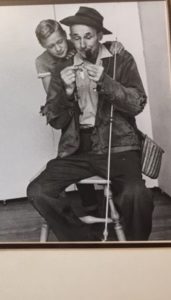 The youngster is Keith Loveless. The picture was commissioned by the State of Maine and appeared on the cover of the Spring 1962 Maine Fish & Wildlife Magazine. Mr. Rockwell was rather talented, wouldn’t you say?
The youngster is Keith Loveless. The picture was commissioned by the State of Maine and appeared on the cover of the Spring 1962 Maine Fish & Wildlife Magazine. Mr. Rockwell was rather talented, wouldn’t you say?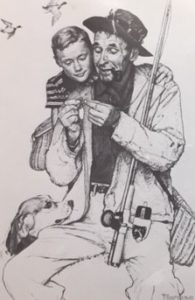
I thought this was an appropriate time to include it in the column, to coincide with the beginning of the spring fishing season.
Today is Acid Rain Collection Sunday
If you know Marc Hoechstetter of West Cummington, Lauren Gaherty of Pittsfield, Richard Green of Monterey, Cindy Delpapa of Becket or Andy Kawczak, you might want to thank them for volunteering to get out of bed early this morning and trudging to designated water bodies to collect water samples. One volunteer has to hike nearly a mile uphill to collect a sample out of a reservoir. The samples are then consolidated and transported to laboratories at Westfield State College or the Springfield Water and Sewer Commission for analysis for ph, alkalinity, major cations, anions and stable isotopes.
Similar collections and analyses are conducted by volunteers across the Commonwealth on the same day. It is part of the Acid Rain Monitoring (ARM) Program that was originally established by Dr. Paul Godfrey from UMASS 36 years ago. Since that time, dedicated volunteers have been gladly dipping their bottles into the frigid waters doing their part to help in this program.
Their work has not gone unnoticed for in in 2013 (30th anniversary of the ARM project) they all received formal Citations from Governor Deval Patrick, “In appreciation of their commitment to ecosystems of the Commonwealth.”
Fishing Derby
The Berkshire Hatchery Foundation in Hartsville-New Marlborough is having a free children’s fishing derby next Saturday, April 13 from 9 to 10:30 am at its lower pond. Children aged 12 and under must be accompanied by an adult. These fishing derbies will run once a month through September of this year.
Help our endangered critters
If you haven’t filed your State income taxes yet, there is still time to help support the recovery and protection of rare species and their habitats by contributing on Line 33A for Endangered Wildlife Conservation on the MA state income tax form. All funds go to MassWildlife’s Natural Heritage and Endangered Species Program.
Massachusetts Junior Duck Stamp Contest
Congratulations to Tiffany Xiao, a student of the Apple-Leaf Studio in Boxborough, who won Best of Show in the 2019 Massachusetts Junior Duck Stamp (JDS) Contest. Her acrylic painting of a Barrow’s Goldeneye pair was selected from 232 entries. 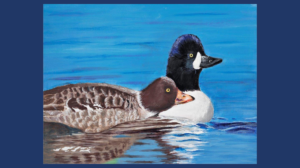 Xiao’s award-winning work will move on to the National JDS Contest to be held in Laurel, MD. Good luck, Tiffany!
Xiao’s award-winning work will move on to the National JDS Contest to be held in Laurel, MD. Good luck, Tiffany!
Students from kindergarten through 12th grade from across the Commonwealth submitted original works of art depicting waterfowl in appropriate wetland habitat, demonstrating both artistic talent and a knowledge of the value of wetlands for wildlife. In March, MassWildlife hosted an awards ceremony for the top 100 winning artists at Field Headquarters. A combination of the top 100 artworks will be exhibited throughout Massachusetts in the coming year.
The Massachusetts JDS Program is sponsored by MassWildlife and the U.S. Fish and Wildlife Service, with support from Massachusetts Sportsmen’s Council. You can support the JDS Program and wetland conservation by purchasing Junior Duck Stamps featuring national winners from previous years. A limited number of Junior Duck Stamps is available for purchase at MassWildlife’s Westborough Office (cash or check only) or buy online at duckstamp.com.
Words of Wisdom
On Saturday evening, March 23, I had the distinct pleasure of being awarded the Worcester County League of Sportsmen’s Clubs “Words of Wisdom Award” at its Annual Appreciation Banquet at the Wachusett Country Club in West Boylston, MA. That award is presented to a person who is using the media to inform and educate about the contributions made by sportsmen and sportswomen and their clubs.
I was blown away by this honor. I knew that this column had a decent number of readers here in the Berkshires, but was unaware that so many sportsmen in Central MA knew of, much less read it. I thank the WCLS for considering me for this award. It means an awful lot to me and I shall never forget that evening.
It was also really cool that MA Fish & Game Commissioner Ron Amidon presented the plaque to me. You may recall that he was one of our group of eight flyfishermen who traveled up to Labrador in September of 2016 to fish the Minipi River system for large brook trout. (That was before he became a VIP!) To make that evening even more memorable, several of the flyfishermen who made that Labrador trip (and their spouses) were also there that evening. Seated at our table were Mike and Clair Shepard of Dalton, Mike and Diane Miller of Athol. Carl Racie from of Athol, who had fished with us in Quebec, was also there with Joan Starrett.
I also received citations from the State Senate and the House of Representatives.
Additional recipients that evening who you may recognize were Wayne MacCallum, who was named the WCLS Sportsman of the Year Award. He is the former Director of the MA DFW who served in that capacity for over 25 years. Another recipient was former DFW Youth Turkey Hunt Coordinator Astrid Huseby who recently was promoted to DFW Recruitment, Retention and Reactivation (R3) Coordinator. She received the Youth Mentor Award. Other award recipients were State Senator Donald F. Humason, Jr. who received the Legislator of the Year Award for his vigorous work on Beacon Hill supporting sportsmen’s causes. Will Rogers a central Massachusetts farmer received the Farmer of the Year Award. He was acknowledged for opening his farmland to hunters and fishermen. Rosemary Charon who has devoted countless hours to the WCLS, was inducted into its Hall of Fame.
I was also surprised to see how popular the outdoors sports are there. The WCLS represents over 25,000 sportsmen and women from over 50 clubs in Worcester County. According to Commissioner Amidon, that evening’s event drew approximately 275 people, a half dozen State Representatives, three State Senators, Lieutenant Governor Polito, EOEEA Secretary Matthew Beaton and many other dignitaries.
So, to the Central Massachusetts sportsmen/women and conservation minded readers who I previously did not know read this column, THANK YOU! And thanks for the wonderful work you are doing to conserve our environment and introduce our youth to it.
Incidentally, outdoor sports columnist Mark Blazis of the Worcester Telegram & Gazette wrote an excellent article covering that event in the Outdoors section of the March 26, 2019 issue entitled “State’s best sportsmen, women and outdoors advocates duly recognized”.
More Thanks
Last month marked my 15th year of writing the Berkshire Woods and Waters column and I also want to take this opportunity to THANK YOU, the local readers and contributors who have provided oodles of information and photographs for this column over the years. THANK YOU to the Berkshire Eagle for providing space for the column and to the sports editors who have cleaned up my messes and made me look good over the years. I also THANK my “in house” editor, (my wife Jan) who checks my copy before submitting and who has pretty much kept me out of trouble over the years.
It’s been my great pleasure to share our Sunday mornings together.
2018 Berkshire County League of Sportsmen Award winners are announced
At a recent meeting of the Berkshire County League of Sportsmen (BCLS) four area outdoor sportspeople/conservationists were selected to receive awards. They are as follows:
Louis Robesch, of Pittsfield, will receive the Sportsman of the Year Award. He has been a Hunter Education Instructor for 45 years. He taught many young students at both Pittsfield High School and Taconic High School. He is credited for educating many family generations to be responsible hunters and fishermen with his knowledge and guidance. He is a member of the Lee Sportsmen’s Association and the Lenox Sportsmen’s Club.
Incidentally, while serving as a private in the 1st Battalion, 9th Marines, Delta Co 3rd Herd for 4 years, he received a Purple Heart while serving in Vietnam.
Jason Sniezek, of Adams, will receive the Outstanding Achievement Award. He is a physical education teacher at Hoosac Valley High School in Cheshire, who was instrumental in working with the BCLS and other organizations to bring the National Archery In Schools Program to Hoosac Valley.
This past fall “Jay” launched an inaugural program crafted as a “Hunter Safety Course”. Using pieces from the Mass Hunter Education Program, the NASP standards, and life/practical experience, he took a small group of students with only one active hunter, on an adventure to learn new skills. They learned to put up a tree stand, animal tracking (with fake blood), archery and outdoor survival which included building lean-tos with materials they found around them, fire building and celebrating it all with a hot dog roast on their fire!
The confidence building and skills learned will last this group for a lifetime. This program was featured as a Berkshire Eagle Classroom of the Week. Jason is hopeful that Hoosac Valley will continue this program with the possibility of expanding it to include hiking and camping as well.
Incidentally, he is the long-time coach of the Hoosac Valley golf team and was instrumental in bringing that team to the Western Mass Division II title last fall, and was recently recognized as Coach of the Year by the Berkshire Eagle.
Virginia DuBois, of Lee, will receive the Sportsmen’s Appreciation Award. She has been a Lee Sportsmen’s Association (LSA) member for many years and has become a huge asset of the club. Besides being a Board member and Membership Chairman, she finds time to help with many youth programs including the SCTP Buckshots clay team, youth archery, youth fishing derbies, ice fishing derbies and turkey shoots. She is co-chair of the LSA and DU Youth Fund Raising Gala and the Steak & Lobster dinner. The LSA sends two youths every year to the Mass Junior Conservation Camp and Virginia is part making that happen.
Jane Winn of Pittsfield will receive the Lifetime Achievement Award
Long an environmental advocate and mobilizer of community interest and involvement in wetlands permitting deliberations and open space preservation in the Berkshires, Jane Winn is fierce in her determination and seldom willing to take “no” for a final answer. She has demonstrated many times that perseverance is a powerful advocacy skill. Her interest in protecting wildlife and the health of natural systems led to the creation of the Berkshire Environmental Action Team (BEAT).
The Massachusetts Association of Conservation Commissioners (MACC) said of her, “With the creation, fundraising, nurturing and day-to-day management of BEAT and the weekly e-publication of The BEAT News, Jane has become a leading spokesperson on environmental issues. Her courage, dedication, and boundless energy have already produced stunning successes – and are creating a broad constituency of knowledgeable, caring activists and stewards to carry the work forward.”
Jane has either led or was involved in numerous culvert projects, stream teams and river clean-ups. A few years back she played a pivotal role in stopping a train near Morewood Lake which certainly would have derailed due to a railbed washout.
Last year, in cooperation with the Housatonic Valley Association, BEAT was involved in a culvert replacement project on Hancock Road in Pittsfield. Swapping out old and inadequate cement pipes allowed brook trout to migrate on Churchill Brook, which feeds into Onota Lake. The roughly $400,000 cost of the project was paid for by a Natural Resources Damages Fund related to the GE clean-up.
BEAT has organized forums and workshops on certifying vernal pools, has trained more than 350 volunteers in various projects from wildlife habitat assessment to river clean ups to road/stream wildlife crossings, and serves on the organizing committee for the Northeast Wildlife Trackers Conference, as well as organizing many other smaller walks, talks, and information sessions
BEAT is a member of the Citizens Coordinating Council, advocating for higher standards for cleaning up GE’s contamination of the Housatonic River.
BEAT monitors, watchdogs, informs, surveys, tracks, educates, trains, organizes and advocates.
BEAT has a free weekly newsletter, a website (with a great tutorial on the Wetlands Protection Act among other resources) and hosts Pittsfield Green Drinks, a monthly gathering of environmentally-minded individuals.
When a new fracked gas pipeline was proposed for the area, BEAT started holding meetings and giving presentations. In a small town of Cummington (pop. 3000), they filled a church. The crowd immediately began organizing.
BEAT began videotaping the Pittsfield Conservation Commission hearings which are now broadcast by Pittsfield Community Television. BEAT also videotapes for broadcast the Berkshire Metropolitan Planning Organization meetings, and many other meetings about environmental activities. These meetings are broadcast on local community access television.
Beat has also worked hand in hand with the BCLS on projects and initiatives supported by both organizations both locally and Nationally, such as the ACEC designation of October Mountain, the Clean Air Act, The Mercury Rule as well as others. She has received numerous awards and certificates of appreciation from various environmental organizations. Space does not allow me to list them all which have been attributable to Jane, her husband Bruce and BEAT. (I hope to list more of them when I report on the upcoming Conte Memorial Awards Banquet.)
The above awards will be presented at the BCLS Silvio O. Conte Memorial Awards Dinner at the Cheshire Rod and Gun Club on Saturday evening April 27. This year the event will also be in honor of the late George “Gige” Darey.
Please note that the social hour and dinner times have changed. The social hour now begins at 4:30 with dinner at 6:00 PM. Tickets which cost $30 can be obtained from any BCLS delegate.
Incidentally, at the last elections, the following individuals were elected officers of the BCLS: President – Wayne McLain of North Adams, VP – Robert McCarthy of Williamstown, Treasurer – Dan Kruszyna of Cheshire and the Secretary is me.
Ice fishing season is about over
Time to call it quits for ice fishing this year. For some, including Dylan and Camden Blake of Lenox, it was a very good year. Fishing with their father James, grandpa Peter and friend Les on a small lake in West Stockbridge earlier this month, they caught the pictured pickerel, some bass and perch. 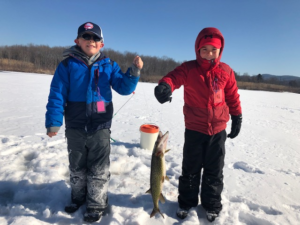 According to Peter, it was a day with” a great blue sky, little wind and willing fish to be caught and released”.
According to Peter, it was a day with” a great blue sky, little wind and willing fish to be caught and released”.
5th Annual Ducks Unlimited and Lee Sportsmen’s Club Association’s Gala
The Gala will take place on Saturday, April 6 at the Pittsfield Country Club, 39 South Street, Pittsfield, from 4:00 to 10:00 pm. It is billed as an evening of fantastic food, great raffle prizes, silent and live auctions…all to support the youth sportsmen of the Berkshires and Ducks Unlimited’s mission of wetlands conservation.
They will be auctioning off hunting trips locally and around the world, trips to wine country, Belize, Costa Rica, St. Thomas, Cabo, Pebble Beach Golf excursions and more.
Tickets can be bought by calling Virginia DuBois @ 413-446-5404.
New Land Protected
At the March meeting of the Berkshire County League of Sportsmen, DFW Western District Supervisor, Andrew Madden, reported that MassWildlife recently acquired 70 acres of land in the town of Sheffield on Guilder Hollow Road. The property abuts the Dolomite Ledges Wildlife Management Area and contains open fields, steep cliff sides, and excellent habitat for deer, bear, turkey and other game species. Boundary marking and parking access will be completed this spring.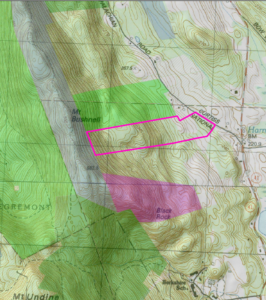
This and all other DFW wildlife management areas are open to the public for hunting, fishing, trapping and other passive recreation such as bird watching, hiking, etc.
Black bears relocated from dangerous area
Well, we knew that sooner or later the black bear population would be spreading into eastern Massachusetts. To get there quicker, it appears that they are taking to the highways. Did you hear about the mama bear and her two cubs that denned up on a highway median strip along Route 2 in Templeton? The following information was obtained from the MassWildlife web site:
On the morning of March 14, MassWildlife, with the help of transportation and law enforcement officials, closed Rte. 2 in the Templeton area for a short period of time to successfully immobilize and relocate a GPS-collared female black bear with two cubs from a wintering den site in the highway median strip.
Based on the GPS-collar data, MassWildlife biologists know the adult female went into this den site for the winter in November. She gave birth to her cubs some time in mid to late January. MassWildlife officials chose to relocate the bear family to a safer and more suitable location in a nearby wooded area to reduce the risk of vehicle collision when the cubs grow large enough to travel with their mother. The exact relocation site is not being disclosed to protect the safety of the young cubs at this particularly vulnerable phase of their lives. 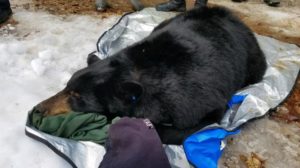
The adult female bear weighed 206 pounds; her two cubs (1 male and 1 female) each weighed a hefty 8+ pounds. The adult female is one of over thirty bears involved in a MassWildlife research project comparing differences between suburban-dwelling bears and bears residing in more rural areas. MassWildlife biologists are gathering data by collaring bears with radio telemetry and GPS-collars in the Berkshires, Connecticut River Valley, and Worcester County.
MassWildlife officials are reminding the public that March is the month when hungry bears emerge from their winter dens and seek out food. Natural foods such as acorns and other nuts are usually available on the ground, but last year’s fall hard mast crop was meager. Other seasonally available natural foods eaten by bears, such as skunk cabbage, are mostly ignored when there is an easy and more filling meal at backyard bird feeders, chicken coops, beehives, garbage cans, and dumpsters.
To prevent conflicts between people and bears, MassWildlife urges homeowners and food-related business in northern Middlesex County, Worcester County, western Massachusetts, or other areas where bears have been seen, to take down bird feeders and secure dumpsters and other waste containers. Beekeepers and poultry owners are advised to set up electric fencing as protection against marauding bears. For more information about black bears in Massachusetts and watch a video titled “Don’t Feed Bears, Keep Them Wild” visit mass.gov/bears.
Rocky Mountain Elk Foundation
From time to time, I am asked why this column promotes the local annual Rocky Mountain Elk Foundation (RMEF) banquets. They note that we don’t have any elk around here, and there aren’t that many local sportsmen who go out west to hunt elk.
Well, there are a surprising number of elk hunters in our area, but let’s consider the following: Just in the year 2018, the RMEF carried out 179 habitat enhancement projects benefitting 134,699 acres in 27 states and permanently protected 13,431 acres in 8 states. Since inception in 1984, the RMEF protected or enhanced 7.4 million acres, roughly 3 ½ times the size of Yellowstone National Park.
During 2018 it opened/improved access to 26,566 acres in 5 states. Since inception, it opened or improved 1.2 million acres, roughly 2 ½ times the size of the Great Smokey Mountains National Park.
That same year volunteers in 500+ chapters across 49 states raised record revenue for local and nationwide conservation missions. (fence pulls, construction of wildlife water developments, are among a few). In just that year, it provided $715,617 in funding to assist with 39 elk research projects and studies in 14 states plus 7 projects with national implications.
Since inception the total value of its work is estimated to be $1.1 billion. It has assisted with successful elk reintroductions in Kentucky, Missouri, North Carolina, Tennessee, Virginia, West Virginia and Ontario, Canada.
The local RMEF banquets are always very well attended. I suspect that most people who attend them will never hunt elk, but never-the-less they do feel good about doing something to increase elk habitat and help assure their survival.
Remembering George “Gige” Darey
Well, it’s been about 3 months since George “Gige” Darey of Lenox passed away. Readers may recall that he served 38 years on the MA Fish & Wildlife Board, 35 of which as its chairman. I’m not sure that all the accolades bestowed onto him fully covered his accomplishments while serving on that board. So, let’s take a look back and consider some of what he accomplished while serving on that board as recapped by F&W Board Vice Chairman Mike Roche: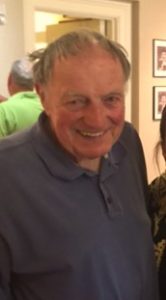
• In 1978, when Gige took his seat on the Board, there were 4,000 acres of land protected by DFW. Today there are over 200,000.
• The deer harvest was 3,107. Last year it was over 13,000.
• Wild turkey was an experiment in 1978. Now the kill is over 3,000 a year.
• There were no nesting bald eagles in 1978. Since then 702 eagles have fledged with 68 nesting pairs last year.
• The pheasant program got to a point where it became self-sustainable.
• Regulations requiring the switch from lead shot to steel shot for waterfowl hunters were implemented.
• The Piping Plover was an endangered species back then, but now MA has most of the east coast piping plover population.
• The National Heritage Program was transferred from the Department of Environmental Management to MassWildlife in 1990 and the non-game check-off on tax forms was implemented.
• Gige urged the implementation of the “Presumption of Openness”. Now all land purchased in the Commonwealth is presumed to be open to hunting and fishing.
• There has been no license fee increase in over 20 years.
• He was heavily involved in the establishment of the Mass Outdoor Heritage Foundation, a non-profit (501c3). Those funds are used for such projects as wild brook trout restoration, and other worthy projects.
• Unlike many other states that allows Sunday hunting, he was able to obtain compensatory hunting dates for migratory bird hunting in Massachusetts.
• The Deer Management Zone system was implemented to improve opportunity for sportsmen.
• The Wildlands Stamp was established where sportsmen self-imposed a $5 assessment to the sale of hunting and fishing licenses. These funds were to be dedicated exclusively to the protection of wildlife habitat open to hunting, fishing, and other wildlife related recreation and science-based management of wildlife and wildlife habitat.
• A financial partnership with Ducks Unlimited for conservation efforts in Canada was established.
• A Memorandum of Understanding with the Environmental Police was established to increase resources and improve the outdoor education programs.
• Gige promoted the Archery-in-the-Schools program.
• He was Board Chairman when construction of the new DFW headquarters took place– one of the world’s finest and most environmentally progressive buildings.
• He fought hard to keep the DFW Director’s position from becoming a political appointment and keeping it in the hands of fish and wildlife professionals.
And, if I may add a few more that Roche did not mention:
• He fought for and finally obtained the Trout Catch & Release Sections in the Housatonic River in Lee and Stockbridge, and while at it, got the trout stocking program established which enhanced it. He accomplished the same for the Millers River.
• He was heavily involved in the environmental battle with GE for clean-up of Housatonic River.
• Gige was heavily involved with the ACEC (Area of Critical Environmental Concern) designation on the Housatonic River.
• Leveraging State and town funds, he played an important role with the Town of Lenox acquisition and conservation of the Post Farm, Parson’s Marsh and the Edith Wharton Park.
He accomplished a lot during that time period, ey?
Freshwater Fishing Gold Pin winners are announced
Each year, MassWildlife recognizes anglers who catch exceptional freshwater fish in waters open to the public. If you submit the largest or longest fish in an eligible species category, you will get a gold pin and a plaque, and you’ll also be honored in a MassWildlife awards event.
Log onto https://www.mass.gov/service-details/gold-pin-winners to see all of the 2018 winners in the Adult Catch & Keep, Youth Catch & Keep and Catch & Release categories. You will notice that there were 4 gold pins awarded to local anglers or fish caught out of local waters.
In an upcoming ceremony to be held at the MassWildlife Field Headquarters in Westborough, MA, the lucky anglers will receive gold pins and plaques commemorating their great feats.
Winners/waters from our area were as follows:
Adult catch & keep category:
Brown Trout, 9 lbs10 oz caught out of Onota Lake by Kevin Janis of Pittsfield; Carp, 30 lbs 1 oz, caught out of the Housatonic River in Lenox. Northern Pike, 19 lbs6 oz caught out of Onota Lake by Bryan Kopola of Windsor. (You may remember that Kevin Janis caught last year’s gold pin Northern Pike out of Cheshire Reservoir).
Catch & release gold pin winners
Northern Pike, 42 inches, caught out of Onota Lake by Joshua Blood of Agawam,
2018 Angler of the Year award winners
The Catch & Keep Angler of the Year Award is given to the person who weighs in the largest number of species that meet the minimum weight requirements for the previous calendar year. The award promotes awareness of the Commonwealth’s underutilized fish species and recognizes an angler’s ability to catch a wide variety of trophy species.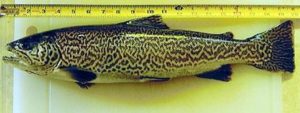
The Catch & Release Angler of the Year Award is awarded to the person who submits the largest number of species that meet the minimum length requirements for the previous calendar year.
This year the winners were:
Adult Catch & Keep Category: Todd Matera of Palmer, MA with 11 species. Matera received State pins for the following fish: brown trout, carp, channel catfish, crappie, landlocked salmon, largemouth bass, smallmouth bass, sunfish, white catfish, white perch and yellow perch. Todd was also the Angler of the year in 2005.
Youth Catch & Keep Category: (There was a tie) Jason Bunar of Kingston, MA with 21 species. He received State pins for the following fish: bowfin, brook trout, brown trout, bullhead, carp, chain pickerel, channel catfish, crappie, lake trout, landlocked salmon, largemouth bass, northern pike, rainbow trout, shad, smallmouth bass, sunfish, tiger trout, walleye, white catfish, white perch and yellow perch. Jason was also Angler of the year in 2016 and 2017.
Andrew Langley, Peabody, MA, also with 21 species. He received State pins for the following fish species: bowfin, brook trout, brown trout, bullhead, carp, chain pickerel, channel catfish, crappie, lake trout, landlocked salmon, largemouth bass, northern pike, rainbow trout, shad, smallmouth bass, sunfish, tiger trout, walleye, white catfish, white perch and yellow perch.
Catch & Release Angler Category: Michael Nee of Northborough, MA with 25 species.
Michael received state pins for the following species of fish: bowfin, brook trout, brown trout, bullhead, carp, chain pickerel, channel catfish, crappie, lake trout, landlocked salmon, largemouth bass, northern pike, rainbow trout, shad, smallmouth bass, sunfish, tiger trout, walleye, white catfish, white perch and yellow perch. Michael was also Angler of the year in 2015, 2016 and 2017.
New State record fish caught in 2018 were as follows in the Catch & Release Category:
Bowfin – 30 inches caught out of the Connecticut River in Springfield by Kevin Lavimodiere of North Attleboro.
Bullhead – 20.75 inches caught out of Baldpate Pond in Boxford, by Roger Aziz, Jr. of Methuen. Landlocked Salmon – 27.25 inches caught out of Quabbin Reservoir by Gary Morin of Hardwick.
Largemouth Bass – 25 inches caught out of White Pond in Concord by Tracy Como-Bowe of Concord.
Largemouth Bass – 25 inches caught out of Great Herring Pond in Plymouth by Dylan Towne of Wareham.
Walleye – 29.50 inches caught out of the Connecticut River in Turners Falls by Jason Wingrove of Greenfield.
Walleye – 29.50 inches caught out of the Connecticut River in Holyoke by Michael Taylor of South Hadley.
White Perch – 18 inches caught out of Wachusett Reservoir by Prince Dukuly of West Boylston.
There were no state record fish caught in the Adult or Youth Catch and Keep categories. Probably the reason for so many state records in the Catch and Release category is that this category is still relatively new, having started in 2015 and the records will frequently change for a while.
Coyote attack
A couple of weeks ago a 16- year old Norwell, MA teenager, Anna Hollander, was bitten by what was believed to be a coyote, according to Marion Larson, a spokeswoman for MassWildlife. They are fairly confident that this was most likely a rabid coyote based upon the description of its behavior.
The girl was sitting in her driveway when the animal came up to her and bit her on the arm. “She didn’t see it coming,” said her mother Tara, “It snarled at her and then snarled as it was biting her.
She said her daughter swung her arm, trying to break free from the grip of the animal’s jaws, and then sprinted into the house. Anna ran so fast that one of her shoes came off. The coyote chased her as she ran but stopped when she reached the stairs. Once she was safely inside, she called 911.
The coyote switched its attention to the shoe, grabbed it, shook it violently and ran off with it across the street, and disappeared into the woods. Police searched the area but they were unable to locate the animal. But they did find Anna’s shoe, which was about 10 feet into the woods.
“It has not been seen or heard from since that day,” said Larson, “If it was rabid, it may be dead as the disease kills animals within a few days. We are still reviewing and following up with local officials to determine if there have been reports of unusual acting coyotes.”
The girl was left with several puncture wounds on her arm and had to undergo a series of rabies shots, but she’s expected to make a full recovery.
Coyote attacks on humans are rare. Counting last week’s attack, there have been 12 documented cases of coyote attacks on humans in Massachusetts in the last 21 years, with the first documented attack being in 1998. According to MassWildlife, in most of those cases, the coyotes tested positive for rabies or were suspected to be rabid. Some of the incidents involved coyotes that had become overly accustomed to people, Larson said.
MassWildlife requests people to report any unusual animal behavior to local authorities.
To make your property less attractive to coyotes, MassWildlife officials recommend feeding your pets indoors. Make sure your garbage is secured in tough plastic containers with tight-fitting lids, and keep it indoors whenever possible. Clear away any fruit that falls from trees in your yard, and if you have bird feeders, clean up any birdseed that spills onto the ground. If you see coyotes around your yard regularly, you should probably remove the bird feeders.
Larson said it’s also important to keep coyote attacks in perspective. “You’re far more likely to get bitten by a dog than a coyote. A local Animal Control Officer probably gets more than 12 calls about dog bites in one year in one town.”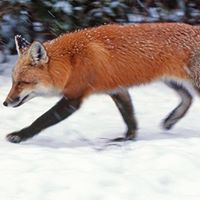
Parts of the above information came from Emily Sweeney’s March 7 article in the Boston Globe entitled, “Norwell mom describes coyote attack on her daughter”.
Coyote Contest
Some 29 coyotes were entered into Dave’s Sporting Goods Coyote Contest this year, and the winner was Carl Dolle of Clarksburg. He bagged the most with a total of 15. Joe Trybus, of Lanesborough came in second with a count of 13. The largest coyote, weighing 42 lbs was taken by Glen Curtis. Congratulations to all.
Spring trout stocking begins soon
Spring trout stocking begins soon
In its March, 2019 newsletter, MassWildlife reported that close to 500,000 brook, brown, rainbow, and tiger trout will be stocked this spring from its five hatcheries located in Sandwich, Palmer, Belchertown, Sunderland, and Montague. These fish, coupled with the more than 65,000 fish stocked last fall, will provide some excellent fishing in the coming months.
Approximately 100,000 trout should be stocked in Western District waters.
The breakdown of the trout to be stocked are as follows:
• Most of the trout will be over 12 inches
• More than 45% of the trout will be over 14 inches
• More than 45,000 brook trout will be over 12 inches
• More than 50,000 brown trout will be over 12 inches
• More than 194,000 rainbow trout will be over 14 inches
• More than 800 brown trout will be over 18 inches
• 1,000 brook trout will be over 15 inches
• More than 2,500 tiger trout will be over 14 inches
Stocking was scheduled to begin in southeastern waters during the first full week of March with other regions of the state expected to follow soon after. The spring stocking is usually concluded sometime around Memorial Day.
Daily stocking updates are available at Mass.gov/Trout, or by contacting local district offices for the latest stocking information. I also plan to list the scheduled stocking locations in this column weekly.
Founding leader of MassWildlife’s Natural Heritage & Endangered Species Program retires
After nearly 35 years of service, Dr. Tom French has retired from his position as Assistant Director of MassWildlife’s Natural Heritage and Endangered Species Program (NHESP). According to the above referenced MassWildlife March newsletter, Tom was hired in 1984 to lead the then newly-formed NHESP. With advanced degrees in zoology, ecology, and systematics, Tom was one of the first MassWildlife employees to not have a traditional game management background, and was the first employee hired to hold a PhD. Tom’s unique background and experience helped NHESP grow to what it is today, one of the strongest rare species programs in the country. 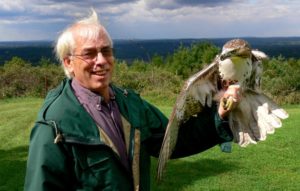
Beginning with just four staff, NHESP has since grown to twenty-nine as the Program’s responsibilities multiplied over time. Milestones along the way include the creation of the state’s first regulatory list of endangered, threatened, and special concern species (1985), passage of the Massachusetts Endangered Species Act (MESA) in 1990, promulgation of MESA regulations (1992), publication of the first BioMap (2001), partnering with Mass DOT to create the Linking Landscapes Program (2009), publishing the 14th edition of the Priority Habitat Maps to aid in regulatory review for rare species (2017), and more. During these 35 years, bald eagles and peregrine falcons have returned to Massachusetts to nest and have flourished, populations of red-bellied cooters have expanded and stabilized, and northern right whales have become the center of extensive conservation attention. By all measures, Tom leaves behind an incredible legacy and leaves NHESP well positioned to tackle conservation challenges into the future.
Although in a managerial position, Tom didn’t just sit at a desk. He remained active in field work, especially when it came to scaling buildings, bridges, and cliffs to band peregrine falcons. He gave numerous talks and published countless articles on the conservation work of NHESP. He dissected prey item remains and prepared whale skeletons for museum collections throughout the country. Tom is a naturalist who is passionate about conservation and his active role in it.
MassWildlife noted that it is losing a great resource, friend, and advocate for the rare animals and plants of Massachusetts. However, it said, “NHESP will continue on, like the well-oiled machine that it is, because of Tom’s leadership and dedication in making the Program what it is today”.
Black bears are active and searching for food: take precautions
MassWildlife cautions us that black bears are now active and seeking food. If you live in northern Middlesex County, Worcester County, western MA, or other areas where bears have been spotted, it’s time to take down your bird feeders. Bears will often ignore natural foods including skunk cabbage in favor of an easy meal at a backyard bird feeder. Other species including wild turkeys and coyotes may also frequent bird feeders leading to a variety of nuisance issues. To avoid these problems, property owners are asked to be proactive by removing bird feeders and other potential food sources including garbage or open compost. 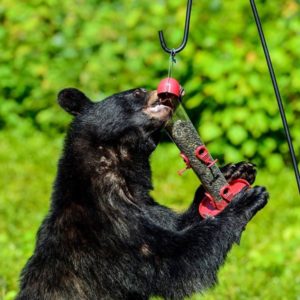
If you enjoy watching birds in your yard, MassWildlife suggests adding a water feature, growing native plants, shrubs, and trees to attract birds. It advises individuals to also secure bee hives, chickens, and livestock. Properly maintained electric fencing is the only way to protect chickens or bee hives from bears. Taking these actions may prevent the unnatural feeding of bears and other kinds of neighborhood wildlife.
Report winter fish kills
Again, from MassWildlife, it reminds us that during winter, thick ice and heavy snow cover can result in low dissolved oxygen levels in ponds. With increasing ice and snow packs, there is less light penetration through the water column. This alters chemical and biological processes, often resulting in a winter fish kill. 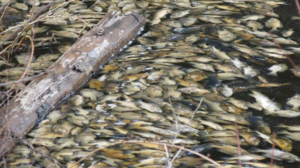
The vast majority of fish kills turn out to be caused by a natural event. However, it’s important for biologists to rule out other causes including pollution. Natural fish kills are generally the result of low dissolved oxygen levels (anoxia), spawning stress or fish diseases. Dissolved oxygen depletion is one of the most common causes of natural fish kills. Weedy ponds that are less than 15 feet deep are particularly vulnerable. This can be the case at any time of the year but generally occurs during severe winters or late spring/early summer.
Ice anglers may encounter signs of a low oxygen environment when they drill through the ice and notice the smell of rotten egg or observe sluggish or dying shiners. The odor is hydrogen sulfide gas which is a natural byproduct of low dissolved oxygen environments, and is not likely the result of pollution. Oxygen levels will be return to normal shortly after the ice melts in the spring.
If you observe dead fish, contact the Environmental Police’s 24-hour radio room at 1 (800) 632-8075. A MassWildlife biologist will review each situation to determine whether the kill is natural or requires a site investigation.
Basic Hunter Education courses being offered
The Lee Sportsmen’s Association will be conducting a 2-session Hunter Education Course at its clubhouse on 565 Fairview Street, Lee. The sessions will run from 6:00 to 9:00pm on Monday, March 25 and from 8:00am to 1:30pm on Saturday, April 13.
The Ashfield Rod & Gun Club will be conducting a 2-session course with Independent Study at 161 North Street, Plainfield. The sessions will run from 6:00 to 9:30 pm on Wednesday, March 27 and from 8:00 am to 3:00 pm on Saturday, April 13.
The East Mountain Sportsmen’s Club will be conducting a 6-session course at its clubhouse on 312 Henderson, Road, Williamstown. The sessions will run from 6:00 to 9:00pm on April 1, 5, 8, 12, 15 and 19.
The Worthington Rod & Gun Club will be conducting a 4-session course at 458 Dingle Road (Rte. 112), Worthington. The sessions will run from 5:30 to 9:00 pm on April 15, 16 and 19.
I am listing these courses well in advance so that you can enroll early. They fill up rapidly. For example, Basic Hunter Instructor Wayne McLain told me that there were over 50 students signed up for his class at the East Mountain Sportsmen’s Club. To enroll in the courses, call (508) 389-7830. For more information, click onto http://www.mass.gov/service-details/basic-hunter-education-course-offerings.
Officers elected at Lenox Sportsmen’s Club
The following people were recently re-elected: President: Tom Ferguson, Vice President: Mark Jester, Secretary: Derek Dubin and Treasurer: Bernie Abramson, all of Pittsfield.
Readers may recall that in last week’s column, I noted that the Stockbridge Sportsmen’s Club takes archery seriously. This winter, they are having the biggest youth league that they have seen with more than 70 people taking part. Well, they are pretty serious about youth archery at the Lenox club, too. Instructor Mark Jester recently commented on Facebook that they also started off with more than 70 shooters in its youth archery league and most if not all of them are still sticking with it.
Small game hunting season closing for the year
According to the MA fishing and hunting regulations, last Thursday, February 28, marked the end of cottontail rabbit, snowshoe hare and fox hunting seasons until they reopen next fall. This week, March 8, the bobcat and coyote hunting seasons end.
You must report your fox and coyote harvest within 4 working days of the end of the season by reporting them at official check station or online. If you report your harvest online, write the confirmation number on a tag and attach the tag to the carcass or pelt. These confirmation numbers must stay attached to the pelt or carcass until that pelt or carcass is prepared for mounting or sold or tanned.
While we are on the subject of regulations, please be aware that there are several hunting season date errors in the printed version of the 2019 Guide to Freshwater Fishing, Hunting, and Trapping Laws involving the bear, snowshoe hare, and furbearer seasons. While all digital versions of the Guide have been corrected, hard copy versions distributed at state offices, retailers, and other license vendors contain hunting season date errors. Click onto https://www.mass.gov/files/documents to find a 1-page hunting season summary with corrected season dates.
Jimmy Fund Ice Fishing Derby
The winners of the 33rd Annual Jimmy Fund Ice Fishing Derby which was held on February 10 were as follows:
Kids Division: 1st Place – Levi Starbird, a 9.25 lbs Pike; 2nd Place – Ricky Rando a 9.25 lbs Pike; 3rd Place – David Bonomi an 8.75lbs Pike.
Young Adults Division: 1st Place – James Lambert a 3.75lbs Brown Trout; 2nd Place – Andrew Clement a 2.75lbs Pickerel.
Adult Division: 1st Place – Ralph Wendling a 14.75lbs Pike; 2nd Place – Jake Burke a 12.25lbs Pike and 3rd Place – Jeff Kucka a 9.75lbs Pike.
Congratulations to all!
Public Meeting on the Conservation and Management of Hoosic River Fish
The Hoosic River Watershed Association (HooRWA) will be having a State of the River Conference on March 11 at 6:00 PM on the campus of Williams College, Williamstown, MA. The event will be held in Room 3 of Griffin Hall. A campus map is available at: https://map.williams.edu.
This year’s conference will feature presentations from three state fisheries biologists from Massachusetts, Vermont, and New York. They will speak on the status and conservation of the fishery resources of the Hoosic River. Following their talks, HooRWA will moderate a panel discussion to enable in depth question and answer, and discussion.
The Hoosic River is known as an outstanding trout fishery through most of its passage from its headwaters in Massachusetts down river into New York. In the lower New York reaches, it also provides excellent smallmouth bass and panfish angling.
Yet the River has challenges, including long-term warming trends, disturbance to the banks of the River causing erosion and siltation, presence of harmful environmental contaminants, and on-going development pressures throughout the watershed.
The HooRWA, with the assistance of the Williams College Center for Environmental Studies, will provide the public an opportunity to ask fisheries experts about the status of the fishery and the current management challenges. By bringing together agency professionals from all three states, the HooRWA seeks to cultivate a tristate discussion that could lead to a greater level of collaboration and cooperation in efforts to monitor the status of the fishery resource, and to adopt appropriate conservation measures to ensure long term benefits for our citizens.
Light refreshments and snacks will be provided
Archery Tournament
The Stockbridge Sportsmen’s Club will be having its Berkshire Championship Archery Tournament on March 16 and March 17. It is a 450-Round Archery Shoot for the benefit of its Scholarship Fund – Aim for Higher Education at the Buckhorn Archer’s Indoor Range, 24 West Stockbridge Road, Stockbridge, MA. The classes of competition are: Adults: compound, freestyle men, compound freestyle women; Bow Hunter Compound Men (Release and Fingers combined); Bow Hunter Compound Women (Release and Fingers combined); Traditional Longbow or Recurve. Choose any one of 3 shooting times: Saturday March 16 at 4:00 pm, Sunday March 17, 9:00 am or 1:00 pm, Youth Shoot 11:00 am Sunday.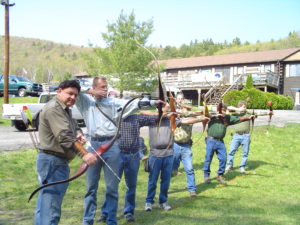
There will be a Chinese Raffle and Silent Auction.
Tickets Only – Corned Beef and Cabbage Dinner Saturday at 6:00 pm – Adults $25 and 12 & Under $10. a Pancake Breakfast on Sunday 7:30 to 11:00am – Adults $8 and 12 & Under $5.
For tickets to dinner, preregister, directions or questions, contact John Mange (518)794-7868 or John Davis (413) 446-9062.
They really take archery seriously at the SSC. This winter, they are having the biggest youth league that they have seen with more than 70 people taking part. The shooting takes place on Saturday mornings.
Keeping with the SSC, congratulations go to Bob Cameron for winning the Red Nose Skeet Championship which was held on December 30. This win follows up his Club Championship last fall.
Its “Déjà Vu” for our Onota Lake Bald Eagles
A message from local wildlife photographer Mark Thorne is as follows: “Its that time of year again for the eagles to be setting up “house” in preparation for another (hopefully) successful year. Same pair as the past several years: female (blue band T98) now in her 17th year, and her mate (gold band WR8) now 13 years old. They have been a pair nesting here since 2014. The female has been at this lake for much longer. I’ve been photographing her since 2007, although I was only able to confirm her identity in 2011”.
“As always, the female is very tolerant of my presence; the male less so. If I pretend that I’m going about some activity he stays, but if I stop and look up at him, he bolts within a minute or two. She will sit watching me for hours without moving.”
“I never tire watching them every year”, Mark said.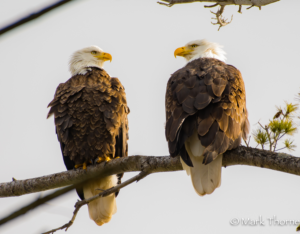
Thank you, Mark, and we never get tired of admiring your outstanding photos.
Fly-fishing Film Festival
The Taconic Chapter of Trout Unlimited invites you to enjoy its fly-fishing film festival at the
Chrissy Farm at the Barrington Brewery in Great Barrington on March 7 at 6:30 pm.
There are 9 award winning film shorts that take you to Alaska, French Polynesia, Yellowstone, the South Fork, and Australia to witness fly-fishing adventures in full color and sound. Trout, sharks, salmon and steelhead are found in some of their grandest habitats.
Taconic TU organizer Bill Travis encourages you to get there early and have a meal and/ or sample their on-location homemade beers. There will be an opportunity to enter a silent auction to win Costa sunglasses, Scientific Angler line, Simms Guide nippers, a Thomas and Thomas Avanti Rod, Yeti Roadie, Ross Reel and other items. (Ooh, bring some cash. This is high quality stuff!)
Tickets are $15 on-line and $20 at the door. On-line tickets are $15 and are available at: https://flyfilmtour.myeventscenter.com/event/Great-Barrington-Ma-31230.
Club Turkey Shoots
The Lenox Sportsmen’s Club and Lee Sportsmen’s Association will be having turkey shoots at their respective clubhouses starting today and running every Sunday through March 31. The hours for the Lenox shoots are from noon to 3:00 pm and the Lee club shooting hours are from 1:00 to 4:00 pm. Both clubs will be offering the winners NY strip steaks, turkeys, pork loins and spiral hams.
The “Greek” now fishes beyond the riverbend
John Kastrinakis, of Lenox, formerly of Lee, fondly referred to as “the Greek”, passed away this past week at the age of 84. A Taconic Chapter TU founding member and its treasurer for the first four or five years of existence, he was a long-time TU Board member. He was also a member of the Atlantic Salmon Federation and he took frequent salmon fishing trips to New Brunswick fishing for the “king of fish”. with friends from the Springfield area. He taught fly tying and fly fishing classes and developed his own well-known killer trout fly called the Greek Grabber. 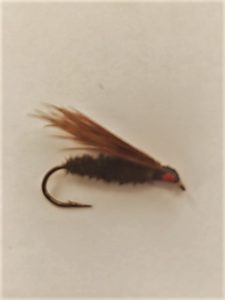 He was a recipient of Taconic TU’s prestigious Crooked Staff Award. He was a valued member of the ROMEOS (Retired Old Men Eating Out).
He was a recipient of Taconic TU’s prestigious Crooked Staff Award. He was a valued member of the ROMEOS (Retired Old Men Eating Out).
Our sincerest condolences go out to John’s wife Joyce and family who also recently lost a son/sibling Paul.
Four new members were inducted into the New England Turkey Hunting Hall of Fame
On February 2, 2019 the National Wild Turkey Federation (NWTF) held its New England Turkey Hunting Awards banquet at the Holiday Inn in Concord, N.H. Award recipients were: Stew Bristol, from Maine, Ed Cotter from New Hampshire and Ellie Horwitz and Joe Judd from Massachusetts. This column is about the Massachusetts recipients.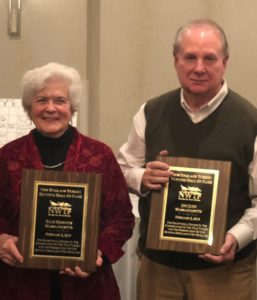
Joe Judd, a member of the MA State Board of Directors of NWTF said this about Ellie: “Ellie Horwitz served the MA DFW as the of Chief of Information and Education for 34 years until her retirement in June, 2011. She was a strong supporter of the NWTF and was a leading advocate behind the Becoming an Outdoors Women (BOW) movement in Massachusetts. Referred to as a “Renaissance Woman”, she held her own in a male dominated field by quickly establishing herself in a role where a woman in an authoritative position was almost unheard of. Her work with the Division was nothing less than remarkable and her teaching skills and innovative thought process brought much to sportsmen and women in MA.”
“In the very early years of turkey hunting in MA, she took to it quickly, realizing the opportunities it could offer to all who love the outdoors and hunting in our State. And she was comfortable and confident in any setting she found herself in whether it be attending the opera, turkey hunting, or in a tense meeting with unhappy sportsmen and other DFW officials.
Her determination to watch women carve out a niche in this great sport was accomplished through her hard work, knowledge, and ability to communicate the message of, “Becoming an Outdoor Women “, clearly and convincingly while offering every program she could find. Everything from bird watching to big game hunting to Dutch oven cooking! It was amazing to watch her work and see the fruits of her labor evolve into an inspirational journey that continues today, literally, throughout the country.
In 1985, she Introduced Project WILD, a national conservation education program for teachers in schools, educators at nature centers, parks and other educational venues. This program began in partnership with Mass Audubon for over 10 years due to their connections with educators across the state.
In 1990, she conceived an interstate watershed education project partnering with NH Fish and Game Department, Mass Audubon, UMass-Lowell and Merrimack Watershed Association, where middle and high school students learned about and conducted water quality tests on any stream, brook or river that eventually made its way to the Merrimack River.
In 1996, she began the Massachusetts BOW program with a weekend of outdoor skills sessions at Eastover Resort in Lenox. Some 68 participants, including many Berkshire outdoorswomen attended this first-time endeavor. Supporters of the program range from the Mass. Sportsmen’s Council, County Leagues, NWTF and many others. Weekend workshops were offered for several years, then some one day and overnight programs offered ranging from Shooting Sports, Winter Survival, Tracking in Winter, Coastal Fishing, Paddling, Becoming an Outdoors Family, to name a few.
In 1999, she initiated turkey hunting seminars and guided hunts for outdoorswomen at Fort Devens that began a partnership with the military that is still going strong today.
Her trusted colleague and longtime friend, Marion Larsen, MassWildlife’s current Chief of Information & Education, said this of Ellie: “In the work that we do, and so much of what Ellie taught me, PARTNERSHIP and COLLABORATION are a big part of how we, and how Ellie got things accomplished. We work in an environment that essentially runs on a shoe-string budget … and partners pooling resources can get things done. That’s what is so great about the partnerships Ellie had, and what we still have today, with groups like NWTF. Ellie realized this and had the vision to nurture these partnerships, thus accomplishing so much as an educator, wildlife biologist and friend. I owe you so much Ellie for helping me in learning to look at projects and programs from partnership perspectives — many hands make light work, which allows everyone to rise with the tide in the spirit, that Ellie taught us, of working together.”
I will leave you with this, said Joe Judd, “ Ellie Horwitz is a friend to all who love the outdoors, who love the land we all have use of, and who respect all God’s creatures, both great and small”.
Incidentally, she is an officer of the New England Outdoor Writer’s Association, serving as its Secretary for many years. She is quite an accomplished hunter not only for turkeys, but she has even successfully hunted big game in Africa.
On a personal note, I first met Ellie when the BOW program was being held here in the Berkshires. I taught fly tying classes for them for several years. Unfortunately, I had to stop as other commitments were taking my time on the same weekend in June.
One cold, stormy, wintery night, Ellie showed up at a Berkshire County League of Sportsmen meeting at the Cheshire Rod & Gun Club in the foothills of Mount Greylock. She wasn’t listed on the program agenda and I wondered what on earth could bring her to the Berkshires on such a miserable night. It turned out that she drove all that way from Concord, MA to present me with a plaque of appreciation for teaching those fly-tying classes for the BOW Program. After she presented it, she drove back home that night. I will never forget that. That’s the kind of person Ellie is.
After presenting Ellie her plaque, Joe sat down, but not for long. Ron Gleason, another member of the MA State Board of Directors of NWTF, surprised Joe by calling him to the podium and presenting him with his own Hall of Fame plaque.
“Joe Judd is a great turkey hunter”, said Gleason, “who has hunted wild turkeys in 15 or more states, including New England, has been a spokesperson for the NWTF for decades, always doing the best possible job in supporting our message. His dedication to turkey hunting and the NWTF spans over 40 years, starting when he saw his first wild turkey in1976. It was love at first sight and his journey to start learning all he could about this bird, had begun. “Little did I know at the time how this bird would not only lead me into a unique hunting experience but also forever change my life in ways I would have never dreamed of!” said Joe.
Joe’s life as a hunter started at a very young age, but his wild turkey hunting career didn’t begin until 1978, on a hill in the Green Mountains, and from that moment on it just never stopped. Being an Independent Insurance Agent allowed him the independence needed to hone is hunting skills. And hone them he did! In 1979, he was asked to write an outdoor column for a small local newspaper, which was just starting up. Thus, a second career had begun and 40 years later his column “On the Ridge,” published in The Greenfield Recorder is being read in New England and beyond.
In 1980, a NWTF chapter was formed in Massachusetts and it wasn’t long before Joe became involved. “Those early years were filled with the “grassroots” of hard work, just trying to get a Chapter off to a good start, especially in a small state like Massachusetts, where a wild turkey was about as foreign to most, as you could imagine” said Joe.
It was during this time that he began to learn about the mission and message of the NWTF. He began working closely with other early committee members just trying to drum up interest and recruit other members. Since those humble beginnings Joe has shown his dedication to the NWTF in so many ways. For example:
In 1988, Joe worked with MA DFW Turkey Biologist Jim Cardoza to initiate funding to create and distribute the first Educational Information Boxes (Safety Leads to Success). He also worked with Jim and with other New England States, in the Live Trap and Transfer Programs.
In 1989, he joined the Quaker Boy Pro Staff which not only expanded his hunting expertise, but also allowed him to work with Dick Kirby, and so many others, producing turkey hunting videos all over the country. This also began his career as a seminar speaker doing over 275 seminars over the past 30 years throughout New England and the East Coast
During that same period Joe has been a Master of Ceremonies in nearly 100 NWTF sanctioned turkey-calling contest in New England and beyond. Prior to this, he served as a judge for many years.
He was chairperson of the first fund raising banquet that exceeded the $10,000 mark in Massachusetts. (Quite an accomplishment 30 years ago). He remained chairperson of the fund-raising banquet for the next three years.
He was also a Local Chapter President later becoming State Chapter President for 2 terms. While State Chapter President Joe spearheaded many projects, one of which was the designation of November 18 as “Eastern Wild Turkey Day”. Working closely with Governor William Weld, he led to the Wild Turkey being named as, “The State Game Bird of Massachusetts”. A special print, along with a Companion Box Call set, was commissioned and spearheaded by Joe twice, benefitting the chapter financially.
As State Chapter President Joe was on the Blue-Ribbon panel that the created the “Be Safe Stickers” which are still used today. Joe also worked with the State on turkey hunting season expansion and limit extensions.
He initiated the efforts to create the first Massachusetts State Chapter Scholarship which
continues today
He worked as a seminar speaker for the first ever Youth Turkey Hunting program in Massachusetts
In 2013 he received the Roger Latham Award which is the highest award given to an NWTF volunteer.
Joe is still working hard as a member of the State Board of Directors. He still does between 8-10 seminars a year and continues to work with the Massachusetts BOW Program. He still conducts seminars in many school districts talking about the State’s number one conservation success story, the re- introduction of the Eastern Wild Turkey.
Ron Gleason wrapped it up by saying, “Joe Judd is a great turkey hunter, sportsmen, and advocate for the sport of hunting. And I know of only a hand-full of people who have devoted more time, energy, and resources in promoting our message as a living, true ambassador of the sport of turkey hunting. He then quoted Joe’s words, “I continue to work for the good of this organization ensuring that the gobble of the Eastern Wild Turkey will never again fall silent in our beautiful New England Hills.”
Wow! A couple of very worthy award recipients, wouldn’t you say?
Berkshire Beagle Club, still flourishing after all these years
In the fall of 1979, the late Ted Giddings wrote this headline in his Berkshire Eagle outdoor sports column entitled Our Berkshires, “Beagle Club flourishing”. He wrote that the club, which was formed in 1932, “had experienced ups and downs but was in better shape than ever with a closed membership of 55.” Well, in the 40 years that have since elapsed, the club has experienced more ups and downs, but today it still survives, has 55 members and there is still a waiting list to join. The feeling remains that restricting membership to 55 is in the best interest of the club. Too many hunters with beagles would stress the bunnies.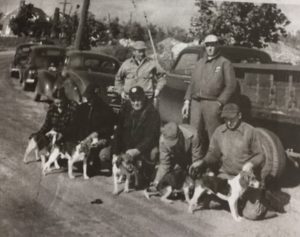
Its amazing that the little club has been able to survive some 87 years now. To be sure, there have been many changes over the years. In the earlier days, there was no internal organization and the only likely beaglers were a handful of small game hunters who sought a way to keep their hunting dogs in training during the months of the year when hunting seasons were closed.
In fact, the first formal meeting of 7 members took place in a funeral parlor. That’s according to Gary Menin who wrote an excellent article about the Berkshire Beagle Club in a 1998 issue of the Massachusetts Wildlife Magazine entitled The Berkshire Beagle Club. He is the son of the late Anthony “Bucky” Menin, a BBC member in the early 1950’s and one-time chairman of the licensed field trials.
According to Gary Menin, there were insufficient funds to purchase any substantial real estate and the earlier trials took place wherever the group was allowed (Lands in West Pittsfield, Lee, Windsor, etc).
The club formed a corporation in June 1951 with the principal officers being: Earl Holt, Karl D. Henry, Robert Minkler, Wellington Nadeau, Elmer Jones, H.C. Huddleston and Harry C Ward. Another founding member was Paul Husky. According to Gary Menin, the group began to grow and, the membership realized that the use of random acreage for training grounds wasn’t sensible. Bunnies leave areas whenever the food supply becomes depleted through forest succession. The members learned how to entice the bunnies by building them shelters (such as brush piles) from weather and predators. Cutting trees and brush to make shelters results in young sprouts, an attractive food for the bunnies. However, most landowners were not always fond of tree cutting on their properties and prohibited it.
Menin noted that the beaglers saved their money and in 1954 were able to purchase 90 + acres in Richmond, MA. According to former Club Secretary David Norton of Pittsfield, they purchased a piece of land and it came with a “19th century mansion. He remembers it having a giant circular staircase. The members converted it into a clubhouse, but it proved too expensive to maintain and it was sold. The house was moved to a place on Rte. 295 in Richmond near the Hillside Orchard and restored. They subsequently purchased a second parcel on the other side of Sleepy Hollow Road. The current clubhouse was built by members in 1961 for $6,000. Some 72 of the club’s 90 acres were enclosed by fencing.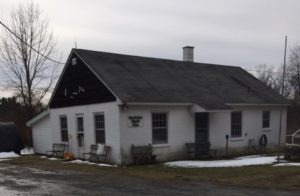
During Norton’s time, he remembers members: Harry Ward, Manual Lester, Mr. Mancivielano, Steve Strauss, George Hamilton, Ken Huddleston, Lambert “Mickey” McGinty, Thomas Dellert, Bill Danford, George Huddleston, Bucky Menin, Syl Lanoe, Carl Henry, Bob Kingsley, George Ripulsa, Ken Hanson, Arthur Giftos, Paul Mangin, Pete Barzie, Lorenzo Briggs, Robert Haunch, Walter Snook, Ed Tierney, Bob Minkler, Al Mazzeo, and others. (Names from the past, ey?) He said that Bucky Menin did more work at the beagle club than any other man.
Over time the membership grew considerably and it was inducted as a member of the American Kennel Club and became subject to the rules and privileges of the AKC. They began having “field trials” (competitive events between members of the BBC and other clubs recognized by the AKC). These AKC Sanctioned field trials continue to this day with three of them being held in 2018.
In the 1980’s or1990’s about 22 acres of land along Dublin Road were sold to the gas company so now there are 35 acres of land which contains the clubhouse on one side of Sleepy Hollow Road and 33 acres on the other side.
In its earlier days, to raise funds, Sunday turkey shoots were conducted. Wives did a lot of work such as cooking and baking pies for turkey dinners. Deb Kuni, Dave Norton’s daughter, remembers going to the club house with her parents on weekends when the wives were cooking. She said that she would sometimes be allowed to help with small chores like setting the tables. The women were all baking and cooking in the big kitchen, laughing and talking.” It was always so warm in there and smelled so good!”, Deb said, and she was torn between wanting to be inside with her mom or outside running the dogs with her dad.
Some days when there weren’t trials going on, Dave would let her go with him to run their dogs. She would shag rabbits and help him keep track of where they went. He showed her how to help the dogs to pick up the trail when the rabbit jumped under a brush pile or went down a hole.
Tim Minkler, son of co-founder Robert Minkler, remembers his late father taking him and his sister to Shadowbrook for 5:00 am Mass, listening to the Seminarians sing, and rushing out to the Beagle Club in time to set up for a Beagle trials on Sunday morning. He remembers that in front of the Club house was a well with an old fashion handle that you had to pump to get the water to flow. “Great fun for kids that were 5 and 6 years old.” He also remembers those pies as being a “big deal”. “I never knew there were so many versions of apple pie.” he said.
On a personal note, although not members, our family benefitted greatly from the BBC. In the 1940-1950’s, my first cousin William Kincaid was a member and big into the field trials, winning some of them and judging others. He bred his own dogs and frequently he would end up having too many pups or perhaps having one that for one reason or another, didn’t meet AKC 13 or 15-inch size specifications (or perhaps he wanted a male and not a female and he would give us those dogs). I can’t remember a time growing up when we didn’t have 2 or 3 great hunting dogs. It was a natural progression for me to eventually take up rabbit hunting and ultimately join the club.
There have been changes over the years. They began raising their own snowshoe hares and cottontail rabbits, gradually released them on club property as needed- the cottontails on one side of Sleepy Hollow Road and the hares on the other. Those bunnies in the rearing pens are treated like royalty – fed, watered, medicated, protected from predators, etc. In addition to the annual dues ($200) and hosting field trials, the club began having bunny hunts in Januarys to help offset its expenses. (No hunting allowed on club property). Sadly, there are no baked pies and turkey dinners anymore, but John Demary, Teddy Billis and others make mean venison and bear meals. During the field trials they and other volunteers prepare the meals.
It was necessary to raise the fencing to 8 feet to prevent deer from jumping over it. (The last thing that a beagler wants is to have his dogs take up chasing deer). To prevent bears, fisher cats, bob cats and other unwanted critters from preying on the bunnies, it was also necessary to put an electric fence along the top of the fence to keep them out. Owls and other raptors started to take their toll on the bunnies and steps had to be taken to protect them. Some perching trees had to be cut, special night blinking lights were installed and screening or other preventative measures were placed atop the rearing pens.
These days, the leaders and heavy lifters of the BBC are: Robert Jones, Jeff St John, Richard Kalisz, John Demary, Rob Kane, Tom King, Pat Barry, Tim Cahoon, Rodney Hicks, Al Costa, Berny Drysgola, and Ray Meandro. (My apologies to anyone that I may have missed). The club is in good hands.
Unfortunately, the amount of local rabbit hunting habitat has severely declined due to development or lands prohibiting hunting. The Berkshire Beagle Club is the only beagle club in the Berkshires where one can unhitch his dog and let it do its thing without fear of being preyed upon, hit crossing a road or getting lost. All persons of good and reputable character, who are really interested in the future of the purebred beagle, are eligible for membership in the Berkshire Beagle Club. Each person applying for membership must complete a membership application and be sponsored by a current member of the Club. The prospective member must also agree to carry his/her share of the maintenance workload.
Many thanks to: Gary Menin, Don Puntin, Dave Norton, Deb Kuni, Dan Barry, and Tim Minkler for providing information for this article.
Gun Course
The Lenox Sportsmen’s Club has announced that the next Mass State Compliant LTC and UTAH gun course will be held on Sunday, February 17, from 9:00 am to 1:30 pm at its clubhouse off of New Lenox Road in Lenox. The price list is as follows: $70.00 MA, $125.00 UT, $125.00 AZ, $125.00 CT and $125.00 FL. Stand-alone prices listed, combine any two for $150.00 – any additional state above two is $50. You must pre-register. For more information, contact Tom Nadolny at (413) 822-6451 or tnadolny1@gmail.com.
Statewide deer harvest in 2018 set a record
According to figures provided by MassWildlife, the preliminary statewide deer harvest for 2018 was 14,513 – a new record high. That compares with the 2017 total of 13,220. The 2018 preliminary harvest figures by season are as follows:
• Youth Deer Hunt Day (Sept. 29): 138
• Paraplegic Deer Hunt (Nov. 1–3): 3
• Archery Season (Zones 1-9: Oct. 15–Nov. 24 and Zones 10-14: Oct 1-Nov. 24): 5,190
• Shotgun Season (Nov. 26–Dec. 8): 6,495
• Primitive Firearms Season (Dec. 10–Dec. 31): 2,687
Zone Adult Male Button Buck Female Total
1 304 14 85 403
2 438 6 97 541
3 462 28 180 670
4N 456 16 154 626
4S 299 11 68 378
5 487 31 186 704
6 111 2 34 147
7 410 46 248 704
8 595 40 250 885
9 786 115 557 1,458
10 1,220 238 1,193 2,651
11 1,773 299 1,292 3,364
12 181 17 101 299
13 354 120 426 900
14 297 123 363 783
Statewide 8,173 1,106 5,234 14,513
MassWildlife believes that deer density and hunter effort tend to be the most important factors influencing harvest from year to year. However, there were two important changes for the 2018 season that may have led to the record harvest. One factor was the opening of over 7,500 acres of Wachusett Reservoir Public Land resulting in a Zone 9 harvest increase from last year by about 300 deer. The other factor was the two-week extension to the archery season in Zones 10-14. That resulted in an increase of over 700 deer being taken during that period.
According to my unofficial figures, the deer harvest has been on an increase over the last several years as evidenced by the following figures which were provided yearly by MassWildlife. Total statewide harvest beginning in 2014 and ending with 2018 were as follows:11,165, 10,142, 12,233, 13,255 and this year’s 14,513. In our Western District WMZ 1 through WMZ 4, the figures were: 1,737, 1,887, 2,197, 2,318 and this year’s 2,618.
MassWildlife noted that while total harvest by zone can be informative, it doesn’t provide the complete picture. Thus, it is important to assess harvest data and monitor trends by Wildlife Management Zones. Total harvest is influenced by deer density and the number of antlerless deer permits that they allocate in each zone, as well as annual changes in hunter effort, harvest-rates, success-rates, weather, etc.
MassWildlife Deer Project Leader David P. Stainbrook will spend the next few months thoroughly analyzing the deer harvest and biological data as well as assessing deer population trends in each zone. The results and recommendations for the 2019 season will take place at the annual deer management review, (usually at the June Fish &Wildlife Board Meeting). A complete harvest summary will be posted on the MassWildlife website shortly after the annual deer review.
Turkey Regulation proposed changes
In my November 18, 2018 column, “MassWildlife proposes new turkey-hunting regulations”, I listed the proposed new regulations and the reasons for the changes which were presented to the F & W Board in November. Here is a condensed recap of the proposed changes.
• Increase the annual limit to three birds (2 bearded turkeys in the spring and 1 of either sex in the fall).
• Increase the daily bag limit to two per day during the spring season
• Expand the fall season (ARCHERY ONLY) to coincide with the archery deer season.
• Allow Youth Turkey permits issued to youth aged 12–14 for use in the fall turkey hunting seasons.
MassWildlife staff will be hosting two informational meetings in February to provide the public with an opportunity to give feedback. Turkey Biologist Dave Scarpitti will make a short presentation on the turkey hunting review and regulation proposals, followed by a Q&A session for the public to give feedback. The meeting dates are: Thursday, February 7 at 6 pm at MassWildlife Field Headquarters (1 Rabbit Hill Road, Westborough, MA 01581), and Wednesday, February 13 at 6:30 pm at the Palmer Public Library (1455 N. Main Street, Palmer, MA 01069).
If bad weather requires rescheduling or cancellation, they will post a notification.
Anyone unable to attend the informational meetings may comment on the changes by mail to: Turkey Season Feedback, MassWildlife Field Headquarters, 1 Rabbit Hill Road, Westborough, MA 01581. Public feedback will be considered by MassWildlife staff and provided to the Fisheries and Wildlife Board. Please note that if changes are endorsed by the Board, a formal public hearing and public comment period will be scheduled and publicized.
Culvert Replacement Municipal Assistance Grant Program
The MA Division of Ecological Restoration (DER), Massachusetts Department of Fish and Game, is seeking proposals from Massachusetts municipalities interested in replacing an undersized, perched, and/or degraded culvert located in an area of high ecological value. Total funding available in FY20 is anticipated to be $750,000. Additional funding from other sources may be available and further details, including eligible towns and projects, will be included when the Request for Response (RFR) is issued on February 20, 2019. The purpose of this funding is to encourage municipalities to replace culverts with better designed crossings that meet improved structural and environmental design standards and climate resiliency criteria.
Only projects that intend to meet the goals of the Massachusetts Stream Crossing Standards will be considered for funding. Incorporating these Standards into culvert design will improve river function and access for fish and wildlife, and will reduce hazards to public safety, such as flooding, culvert failure, and road washout. Massachusetts municipalities are eligible to apply for funding to support advancement of one culvert replacement project toward completion. Interested communities should view the full announcement, including eligibility and evaluation criteria, at https://www.mass.gov/how-to/culvert-replacement-municipal-assistance-grant-program.
The PRE-Request For Responses (RFR) period, January 23, 2019 to February 20, 2019, provides a preview of the RFR that DER will issue February 20, 2019. Applicants are strongly encouraged to contact Carrie Banks to discuss possible projects during this period. The RFR will be released at 3:00 PM on February 20, 2019. The application deadline is 5:00 PM, March 20, 2019.
Applicants are encouraged to attend a Grant Briefing to learn more about this funding opportunity. During Grant Briefings, DER Staff will explain the Culvert Replacement Municipal Assistance Grant Program, answer questions, and be available to meet one-on-one with municipalities to discuss proposed projects. A local Grant Briefing information is scheduled on February 4 from 1:00 to 2:30 PM at the Adams Town Hall, 8 Park Street, Adams. Attendees should RSVP to carrie.banks@mass.gov or 413-579-3015 in case of inclement weather and the briefings either need to be canceled or postponed. Check the Division of Ecological Restoration’s website (www.mass.gov/DER) for the most up-to-date information regarding grant briefings.
Bunny Hunt Results
Some 20 hunters signed up for the Berkshire Beagle Club bunny hunt and game dinner which was held on Saturday, January 26. Four cottontail rabbits were checked in and the largest one weighed 2.89 lbs. It was bagged by David Morris, of Lee, in front of Tom King’s (of Cheshire) dog Bomber. Only one snowshoe hare was checked in and it weighed 3.46 lbs. It was bagged by Pat McGrath of Dalton who shot it in front of Tony Cornwell’s (of Peru) dog Izzy. 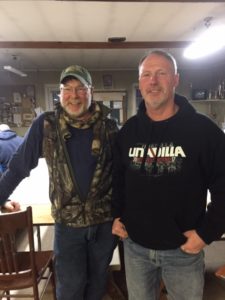
A delectable meal of venison chili, bear chili, venison spaghetti, venison meat loaf and bear stew was prepared by members Dick Kalisz and Ted Billis. There was also a great raffle.
Upcoming Derbies
The 33rd Annual Jimmy Fund Ice Fishing Derby will be held on Sunday, February 10 at the Frank Controy Pavilion on Onota Lake from 6:00 AM to 2:00 PM. Admission is: Adults – $15, Kids – $5. Tickets are available at Onota Boat Livery (413)443-1366, Maces Marine (313)447-7512 or on the day of the derby at the Pavilion. There will be three divisions of trophies and prizes and plenty of good food. For more information, contact Leo Kruczkowski (413)822-2745 or Chico Gelinas (413)282-9486.
The Ashfield Rod & Gun Club’s Annual Youth Ice Fishing Derby will take place on Saturday, February 9 from 8:00 AM to 12:00 PM. Prizes will be awarded for all legally caught fish checked in at the The Ashfield Lake House. After the derby, a spaghetti dinner will be held at Sanderson Academy. There will be a $5 charge for adults, free for kids. Following the dinner, there will be a presentation given by Tom Ricardi on birds of prey. For additional derby information, contact Joe Miraglia at (413) 628-4400.
Rescued attempt for deer has sad ending
On Thursday morning, January 17, The Western District Office of MassWildlife was called upon to rescue a 180-190 lbs buck that was stuck on the ice on Pontoosuc Lake. According to DFW Western District Supervisor Andrew Madden, the deer was splayed out on the ice, couldn’t get any grip and appeared to be injured. Although there was a lot of blood and the animal’s tail was missing, the DFW staff was hopeful that after assessing its injuries, perhaps they could treat and release it back into the wild.
They had to tranquilize it in order to free it from the ice. DFW Wildlife Biologist Nate Buckhout slowly and cautiously approached the deer with a tranquilizer gun. He tried not to startle the deer and keep it as stress-free as possible to avoid it from trying to get up and hurting itself more. The deer was alert and tried to get up but the ice was too slick
“Nate took a good shot getting the immobilizer into the deer. The drugs worked pretty quickly and all went pretty well,” Madden said. The buck was loaded onto a sled and dragged off by MassWildlife personnel to be assessed. At that time, it wasn’t known whether the deer would survive the wounds and traumatic event.
Thank goodness the ice was solid and they could get to the deer because, if not, they would have had to work with the fire departments on water rescue which can be risky.
After assessing the deer, MassWildlife personnel discovered more serious injuries and determined that they were far too serious for the deer to recover. Unfortunately, they had to euthanize it.
Madden felt that perhaps the deer was chased onto the ice by coyotes, fell down and couldn’t get up due to its being so slippery. On that day the ice was hard with no snow on which to grip.
Although it was not a happy ending, give credit to MassWildlife and all involved for their valiant efforts to try to save that deer.
Want to learn how to ice fish? Attend a Family Ice Fishing Festival
MassWildlife advises us to not let winter keep us indoors. Ice fishing provides anglers with the unique opportunity to fish on a lake or pond without a boat during the cold winter months. If you’re looking to learn how to ice fish, join MassWildlife’s Angler Education Program at an upcoming event this winter.
Two Family Ice Fishing Festivals are scheduled for the Western District this year. Both are free and open to the public with no pre-registration required.
February 2 in Pittsfield – A learn to ice fish event at Pontoosuc Lake (81 Narragansett Avenue) from 9:00 a.m. to 2:00 p.m. (Park on the street around the park and walk onto the lake from there.)
February 9 in Chesterfield – A learn to ice fish event at Scout Pond – Tolgy Wood (the old Chesterfield Scout Reservation at Sugar Hill Road in Chesterfield) from 8:30 a.m. to 12:00 p.m.
Bring your ice fishing equipment, or borrow theirs; equipment and bait will be available on a first come, first served basis. These events are in cooperation with the Western Massachusetts Boy Scout Council. For more information contact Jim Lagacy at jim.lagacy@mass.gov or (508) 389-6309. PLEASE NOTE: Less than 6″ of safe ice, rain, or heavy snow will cancel the events.
Basic Hunter Education courses being offered
By state law, if you are 18 years of age or older and you want to purchase your first-ever hunting license, you must complete a Basic Hunter Education course. Hunters 12 to 17 years of age must adhere to the regulations which are specific to their age. While minors are not mandated to complete a Basic Hunter Education, it is a prerequisite for certain youth programs and it allows minors 15 to 17 years of age to hunt without direct supervision.
In a Basic Hunter Education course, students receive instruction in the safe handling and storage of hunting arms and ammunition, hunting laws and ethics, care and handling of game, and wildlife conservation. Courses are typically 15 hours in length and are offered in different formats to meet the public’s needs. Students under the age of 18 will need a parent or legal guardian’s permission to attend this course. All courses are free of charge and open to the public.
The Cheshire Rod & Gun Club will be conducting a 6 session Hunter Education Course at its clubhouse on 310 Curran Road, Cheshire. The sessions will run from 6:00 to 9:00pm on February 18, 22, 2 and March 1, 4 and 8.
A similar 6 session course will be held at the Pittsfield High School, 300 East Street, Pittsfield. The sessions will also run from 6:00 to 9:00pm on March 5, 7, 12, 14, 19 and 21.
If these courses are not convenient for you, Basic Hunting Instructor Wayne McLain plans to teach a course at the East Mountain Sportsmen’s Club in Williamstown sometime in April, but the dates have not been firmed up yet. As soon as the dates have been established, I’ll pass them on in this column.
To enroll in either course, call (508) 389-7830. Don’t wait! These courses fill up rapidly.
It may be more convenient for you to take the Basic Hunter Education course in another state. A government-issued Basic Hunter Education certificate from any U.S. State, Mexico, or Canada is accepted to meet the prerequisites for purchasing a Massachusetts hunting or sporting license. Many states near Massachusetts allow non-residents to attend their hunter education course offerings.
If you are using your certificate to becoming eligible for your first-ever hunting license and apply for a firearms license please be aware that your local police department will not accept an out-of-state certificate.
For more information, click onto http://www.mass.gov/service-details/basic-hunter-education-course-offerings.
On the Water TV show features Berkshire Waters
Rick O’Neill, of Pittsfield, was fortunate enough last May to get together with Chris Megan, Publisher of On the Water magazine/television show, and Dave Hadden of Old Town Kayaks to film a couple of days of smallmouth and trout fishing in the Southern Berkshires.
According to Rick, they had 2 tremendous days of fishing and filming that included drone and underwater footage. They caught tons of smallmouth bass ranging from 1 ½ lbs to 6 lbs on a pond in Great Barrington. Sorry, you will have to watch the program to see exactly where they caught them.
The show will be airing on Sunday, February 10 at 10:00 am on Channel 26 NBC Boston. While Rick hasn’t seen the final footage, he knows for a fact that they also took lots of film of local attractions and will be trying to promote all that we have to offer here in the Berkshires.
